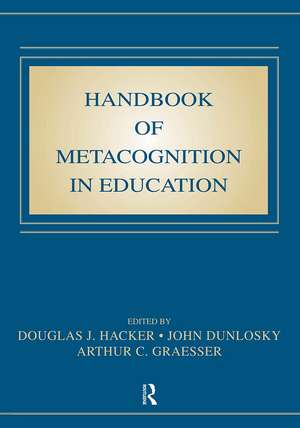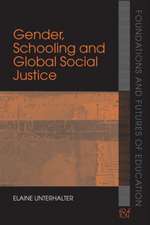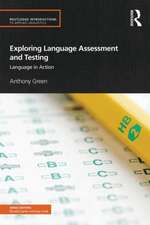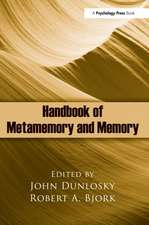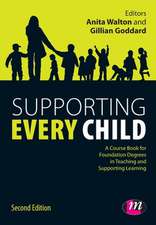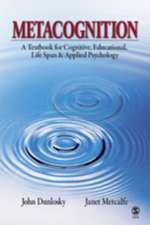Handbook of Metacognition in Education
Editat de Douglas J. Hacker, John Dunlosky, Arthur C. Graesseren Limba Engleză Paperback – 23 iun 2009
- represents an intersection of education, cognitive science, and technology;
- serves as a gateway to the literature for researchers and practitioners interested in one or more of the wide array of topics included; and
- sets the standard for scholarship for theoretical research and practical applications in this field.
| Toate formatele și edițiile | Preț | Express |
|---|---|---|
| Paperback (1) | 796.25 lei 6-8 săpt. | |
| Taylor & Francis – 23 iun 2009 | 796.25 lei 6-8 săpt. | |
| Hardback (1) | 2081.88 lei 6-8 săpt. | |
| Taylor & Francis – 23 iun 2009 | 2081.88 lei 6-8 săpt. |
Preț: 796.25 lei
Preț vechi: 971.03 lei
-18% Nou
Puncte Express: 1194
Preț estimativ în valută:
152.39€ • 157.88$ • 127.17£
152.39€ • 157.88$ • 127.17£
Carte tipărită la comandă
Livrare economică 22 martie-05 aprilie
Preluare comenzi: 021 569.72.76
Specificații
ISBN-13: 9780805863543
ISBN-10: 0805863540
Pagini: 464
Ilustrații: 27 black & white tables
Dimensiuni: 178 x 254 x 25 mm
Greutate: 0.85 kg
Ediția:New.
Editura: Taylor & Francis
Colecția Routledge
Locul publicării:Oxford, United Kingdom
ISBN-10: 0805863540
Pagini: 464
Ilustrații: 27 black & white tables
Dimensiuni: 178 x 254 x 25 mm
Greutate: 0.85 kg
Ediția:New.
Editura: Taylor & Francis
Colecția Routledge
Locul publicării:Oxford, United Kingdom
Public țintă
PostgraduateCuprins
Foreword, Robert J. Sternberg
Chapter 1. A Growing Sense of "Agency," Douglas J. Hacker, John Dunlosky, and Arthur C. Graesser
Part I: Comprehension Strategies
Chapter 2. The Role of Metacognition in Understanding and Supporting Reading Comprehension, Margaret G. McKeown and Isabel L. Beck
Chapter 3. The Role of Metacognition in Teaching Reading Comprehension to Primary Students, Joanna P. Williams and J. Grant Atkins
Part II: Metacognitive Strategies
Chapter 4. Question Generation and Anomaly Detection in Texts, José Otero
Chapter 5. Self-Explanation and Metacognition: The Dynamics of Reading, Danielle S. McNamara and Joseph P. Magliano
Part III: Metacomprehension
Chapter 6. Metacognitive Monitoring During and After Reading, Keith W. Thiede, Thomas D. Griffin, Jennifer Wiley, and Joshua Redford
Chapter 7. The Importance of Knowing What You Know: A Knowledge Monitoring Framework for Studying Metacognition in Education, Sigmund Tobias and Howard T. Everson
Part IV: Writing
Chapter 8. Metacognition and Children’s Writing, Karen R. Harris, Steve Graham, Mary Brindle, and Karin Sandmel
Chapter 9. Writing is Applied Metacognition , Douglas J. Hacker, Matt C. Keener, and John C. Kircher
Part V: Science and Mathematics
Chapter 10. The Interplay of Scientific Inquiry and Metacognition: More than a Marriage of Convenience, Barbara White, John Frederiksen, and Allan Collins
Chapter 11. The Enigma of Mathematical Learning Disabilities: Metacognition or STICORDI, That’s the Question, Annemie Desoete
Part VI: Individual Differences
Chapter 12. Context Matters: Gender and Cross-Cultural Differences in Confidence, Mary Lundeberg and Lindsey Mohan
Chapter 13. Teachers as Metacognitive Professionals, Gerald G. Duffy, Samuel Miller, Seth Parsons, and Michael Meloth
Part VII: Self-Regulated Learning
Chapter 14. Supporting Self-Regulated Learning with Cognitive Tools, Philip H. Winne and John C. Nesbit
Chapter 15. Effective Implementation of Metacognition, Michael J. Serra and Janet Metcalfe
Chapter 16. Self-Regulation: Where Metacognition and Motivation Intersect, Barry J. Zimmerman and Adam R. Moylan
Part VIII: Technology
Chapter 17. Self-Regulated Learning with Hypermedia, Roger Azevedo and Amy M. Witherspoon
Chapter 18. Interactive Metacognition: Monitoring and Regulating a Teachable Agent, Daniel L. Schwartz, Catherine Chase, Doris B. Chin, Marily Oppezzo, Henry Kwong, Sandra Okita, Gautam Biswas, Rod Roscoe, Hogyeong Jeong, and John Wagster
Part IX: Tutoring
Chapter 19. Meta-Knowledge in Tutoring, Arthur C. Graesser, Sidney D’Mello, and Natalie Person
Chapter 20. In Vivo Experiments on Whether Supporting Metacognition in Intelligent Tutoring Systems Yields Robust Learning, Ken Koedinger, Vincent Aleven, Ido Roll, and Ryan Baker
Part X: Measurement
Chapter 21. Measuring Metacognitive Judgments, Gregory Schraw
Chapter 22. Sins Committed in the Name of Ecological Validity: A Call for Representative Design in Education Science, John Dunlosky, Sara Bottiroli, and Marissa Hartwig
Chapter 1. A Growing Sense of "Agency," Douglas J. Hacker, John Dunlosky, and Arthur C. Graesser
Part I: Comprehension Strategies
Chapter 2. The Role of Metacognition in Understanding and Supporting Reading Comprehension, Margaret G. McKeown and Isabel L. Beck
Chapter 3. The Role of Metacognition in Teaching Reading Comprehension to Primary Students, Joanna P. Williams and J. Grant Atkins
Part II: Metacognitive Strategies
Chapter 4. Question Generation and Anomaly Detection in Texts, José Otero
Chapter 5. Self-Explanation and Metacognition: The Dynamics of Reading, Danielle S. McNamara and Joseph P. Magliano
Part III: Metacomprehension
Chapter 6. Metacognitive Monitoring During and After Reading, Keith W. Thiede, Thomas D. Griffin, Jennifer Wiley, and Joshua Redford
Chapter 7. The Importance of Knowing What You Know: A Knowledge Monitoring Framework for Studying Metacognition in Education, Sigmund Tobias and Howard T. Everson
Part IV: Writing
Chapter 8. Metacognition and Children’s Writing, Karen R. Harris, Steve Graham, Mary Brindle, and Karin Sandmel
Chapter 9. Writing is Applied Metacognition , Douglas J. Hacker, Matt C. Keener, and John C. Kircher
Part V: Science and Mathematics
Chapter 10. The Interplay of Scientific Inquiry and Metacognition: More than a Marriage of Convenience, Barbara White, John Frederiksen, and Allan Collins
Chapter 11. The Enigma of Mathematical Learning Disabilities: Metacognition or STICORDI, That’s the Question, Annemie Desoete
Part VI: Individual Differences
Chapter 12. Context Matters: Gender and Cross-Cultural Differences in Confidence, Mary Lundeberg and Lindsey Mohan
Chapter 13. Teachers as Metacognitive Professionals, Gerald G. Duffy, Samuel Miller, Seth Parsons, and Michael Meloth
Part VII: Self-Regulated Learning
Chapter 14. Supporting Self-Regulated Learning with Cognitive Tools, Philip H. Winne and John C. Nesbit
Chapter 15. Effective Implementation of Metacognition, Michael J. Serra and Janet Metcalfe
Chapter 16. Self-Regulation: Where Metacognition and Motivation Intersect, Barry J. Zimmerman and Adam R. Moylan
Part VIII: Technology
Chapter 17. Self-Regulated Learning with Hypermedia, Roger Azevedo and Amy M. Witherspoon
Chapter 18. Interactive Metacognition: Monitoring and Regulating a Teachable Agent, Daniel L. Schwartz, Catherine Chase, Doris B. Chin, Marily Oppezzo, Henry Kwong, Sandra Okita, Gautam Biswas, Rod Roscoe, Hogyeong Jeong, and John Wagster
Part IX: Tutoring
Chapter 19. Meta-Knowledge in Tutoring, Arthur C. Graesser, Sidney D’Mello, and Natalie Person
Chapter 20. In Vivo Experiments on Whether Supporting Metacognition in Intelligent Tutoring Systems Yields Robust Learning, Ken Koedinger, Vincent Aleven, Ido Roll, and Ryan Baker
Part X: Measurement
Chapter 21. Measuring Metacognitive Judgments, Gregory Schraw
Chapter 22. Sins Committed in the Name of Ecological Validity: A Call for Representative Design in Education Science, John Dunlosky, Sara Bottiroli, and Marissa Hartwig
Notă biografică
Douglas J. Hacker is Chair, Department of Teaching and Learning, and Adjunct Professor Department of Educational Psychology, University of Utah
John Dunlosky is Associate Professor, Department of Psychology, Kent State University.
Arthur C. Graesser is Chair, Department of Psychology, and Co-director, The Institute for Intelligent Systems, University of Memphis.
John Dunlosky is Associate Professor, Department of Psychology, Kent State University.
Arthur C. Graesser is Chair, Department of Psychology, and Co-director, The Institute for Intelligent Systems, University of Memphis.
Descriere
Providing comprehensive coverage of the theoretical bases of metacognition and its applications to educational practice, this Handbook of focused and in-depth discussions from leading scholars in the field sets the standard in scholarship for theoretical research and practical usage in this field.
